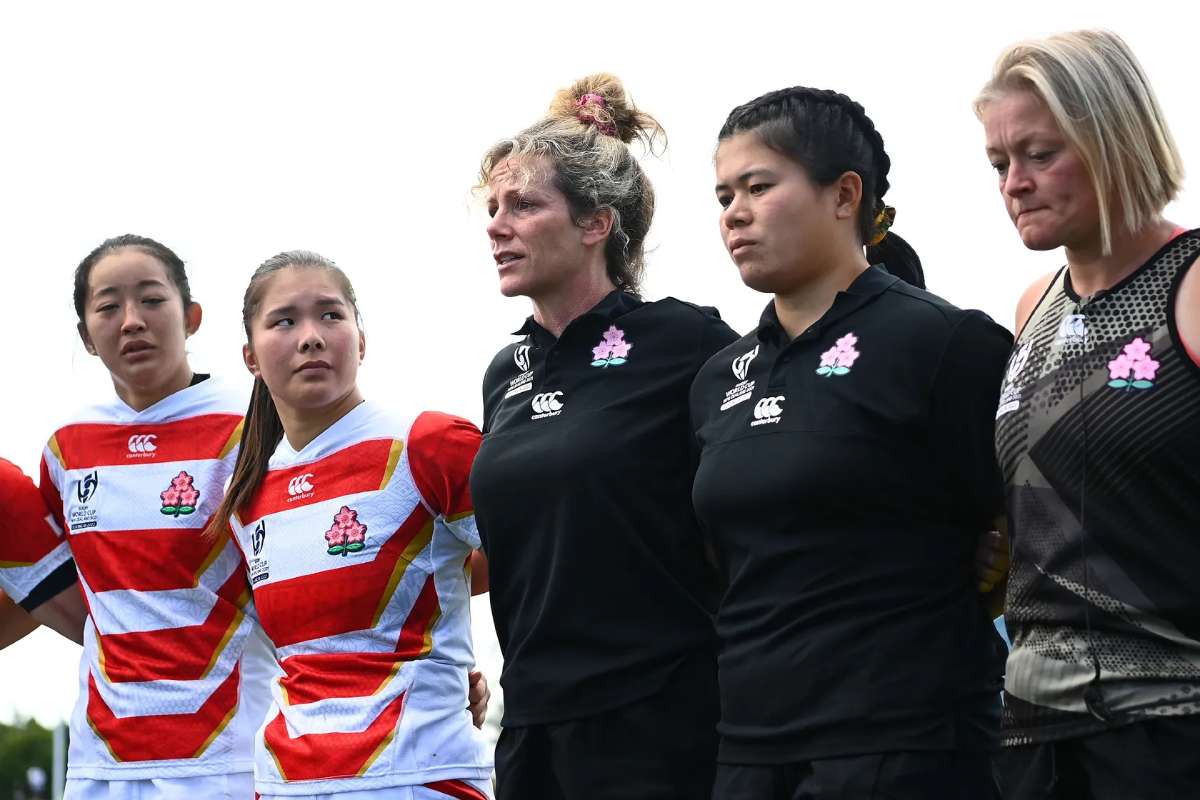We caught up with the Sakura 15s coach, who signed a contract extension with the Japan Rugby Football Union last month.
Lesley McKenzie is motivated to put the lessons of 2022 into practice this year having extended her contract as Japan women’s coach.
Reflecting on last month’s announcement that she will lead the Sakura 15s until at least the end of March 2024, McKenzie told World Rugby that “it wouldn’t have felt like the right time to finish” following Rugby World Cup 2021.
Japan went into that tournament on the back of an impressive five months in which they beat Fiji, Australia, South Africa and Ireland.
They were unable to maintain that form in New Zealand, though, exiting the tournament at the pool phase following defeats to Canada, USA and Italy.
“The job I’ve done is a good job but obviously, none of us feel satisfied with the games that we put on the table in the World Cup,” McKenzie said. “We wanted to win some of our pool games, and we didn’t get that.
“We did get a really good education around why we weren’t able to win those and where we need to get to next and I think that’s what is giving me a bit of momentum towards the next cycle [to Rugby World Cup 2025].
“It’s a really short cycle, it’s only two and a half years essentially, so it’s more of a sprint than anything else.
“And, it would have felt premature to say that I had done a job with this team, even though I am really proud of some of the things that we have done in the meantime.”
- U20 Trophy: The story so far
- World Rugby looks to enhance the flow of the game with law application guidelines
Older and wiser
Having represented Canada at two Rugby World Cups as a player, RWC 2021 was McKenzie’s first as a coach and she admits it was not only her players who will take learnings from their time in New Zealand.
“Genuinely I’ve joked about it,” she added. “The joke is, I feel like a sadder, older, wiser person and I am all of those things but I’m also, you know, in a really good way.
“It was a massive learning for me and to be at the World Cup not as a player, but to be responsible for guiding those experiences of my players and my staff and management was a really great experience for me.
“I mean, it’s clearly irreplaceable by any other form of education, and I’m really happy that I’ve done that.”
On returning to Japan from New Zealand, McKenzie let her players have a month’s break so they could decompress following what was an intense campaign.
Now that the review process has started, she is more confident than ever in the potential that is contained within Japanese rugby.
“That is certainly going to be a big part of my message,” McKenzie said.
“This puts them in really good stead to have a really good go at [RWC 2025] because we’ve got so much that we can achieve or that we can add before the next one.”
Quarter-final goal
In the statement to announce McKenzie’s new contract, Japan Rugby Football Union National Team Director Yoshiyuki Miyazaki stated it was the body’s goal to reach the quarter-finals of the expanded RWC 2025 in England.
McKenzie acknowledges the target adds a certain amount of pressure to her role, but insists it is a challenge she believes she can rise to.
“Of course, it’s a pressure on me, but it’s also achievable,” she said. “That’s going to be a significant and legitimate pressure on every coach that goes to the next World Cup, because we see so many teams that are now centralising contracts, that are going full-time in whatever guise that is for their programme.
“It’s not somewhere that Japan is at yet and so, what I said, it’s back to the races, it really is because we’ve evolved significantly to get to this point and to have some of the results that we had in 2022.
“But at the same time, no one’s standing still and so we’ve got to really double down on how we approach and how rapidly we can shift into the next gear.”
As she looks ahead to a potentially pivotal year for her young squad on the road to England, it is a task McKenzie is “hugely excited” to take on.
“We’re stepping from something solid now and there’s so much clearer understanding amongst the squad,” she said.
“We’re going to take much of the current team into the next cycle and that’s thrilling because it’s not something that Japan’s ever [been able] to use to springboard from. That’s an awareness we’ve never worked with before.
“So, the job for me is going to be raising that awareness and then shifting that onto their shoulders really effectively.
“I think the exciting thing for me as the head coach is that the programme itself, the focus of the programme, has to shift from where we were doing a lot of learning and growing and getting some understanding the last few years; now we’ve got to have a whole different approach.
“What really excites me in the next cycle for a head coach is that I’m going to change the way I deliver.
“I’ve got to change the way they see themselves or how we set them up to take leadership, to take accountability and if we can’t do that, then we’ll fail. But if we can do that, that’s a big step forward for us.”


